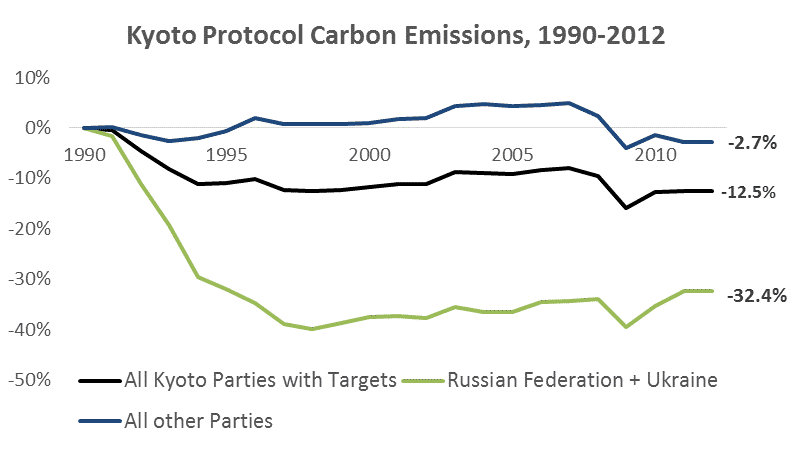
The true-up period was established by Decision 27CMP1 which provides that for the purpose of fulfilling their Kyoto Protocol emission reduction targets Annex I Parties can continue to acquire emission reduction units certified emission reductions CERs assigned amount units AAUs and removal units up to the 100th day after the date. The Kyoto Protocol was adopted in Kyoto Japan on 11 December 1997 and entered into force on 16 February 2005.

Adopted in 1997 the protocol commits 43 Annex I countries to limit their greenhouse gas emissions for the 1st commitment period 2008-2012 by at least five percent below or equal to the level of their emissions in the base year 1990.
Kyoto protocol results to date. Kyoto Protocol international treaty named for the Japanese city in which it was adopted in December 1997 designed to reduce the emission of gases that contribute to global warming. In force since 2005 it was hailed as the most significant environmental treaty. On December 11 1997 in Kyoto Japan the United Nations adopts a new treaty for the purpose of limiting greenhouse gas emissions.
In short the Kyoto Protocol operationalizes the United Nations Framework Convention on Climate Change by committing industrialized countries and economies in transition to limit and reduce greenhouse gases GHG emissions in accordance with agreed individual targets. The Convention itself only asks those countries to adopt policies and measures on mitigation and to report periodically. Under the Kyoto Protocol Parties included in Annex I with commitments inscribed in the third column of Annex B in the Doha Amendment to the Kyoto Protocol as contained in annex I to decision 1CMP8 are required to report data on the issuance and transactions of assigned amount units AAUs emission reduction units ERUs certified emission reductions CERs removal units RMUs and also on various parameters and definitions that are necessary for accounting under the Kyoto Protocol.
On paper countries met their commitments under the 1997 Kyoto protocol. But a deeper look at the final numbers gives little cause for optimism. Wed 16 Feb 2005 1130 EST 1 The international Kyoto protocol controlling emissions of carbon dioxide and other gases blamed for global warming came.
Under the Kyoto protocol most developed nations other than the US committed themselves to targets for cutting or slowing their emissions of the key greenhouse gases that cause climate change. As of June 2013 there are 192 parties to the Kyoto Protocol to the United Nations Framework Convention on Climate Change which aims to combat global warming. This total includes 191 states and one supranational union.
Canada renounced the protocol effective 15 December 2012 and ceased to be a member from that date. With the Protocols 2008-2012 commitment period expiring the Doha. Kyoto 2nd commitment period 201320 Policy.
This period bridges the gap between the end of the 1st Kyoto period and the start of the new global agreement in 2020. In this period the EU some other European countries and Australia. The Kyoto Protocol recognized that developed countries are principally responsible for the current high levels of GHG emissions in the atmosphere as a result of more than 150 years of industrial.
The Kyoto Protocol adopted in Kyoto Japan in 1997 commits 37 industrialized countries and the European Union to the so-called Kyoto target of reducing their greenhouse gas emissions by an average of 5 against 1990 levels over the 2008-2012 period. The Kyoto Protocol KP otherwise called the climate protocol is an international emissions reduction treaty under the UNFCCC. Adopted in 1997 the protocol commits 43 Annex I countries to limit their greenhouse gas emissions for the 1st commitment period 2008-2012 by at least five percent below or equal to the level of their emissions in the base year 1990.
The Kyoto protocol is to date the only international agreement that calls for action to reduce emissions of CO 2. Yet the Harvard scientists and economists who study climate change express almost universal criticism of the accord which they fault as economically inefficient unobjective inequitable andworst of allineffective. The Kyoto Protocol was adopted in Kyoto Japan on 11 December 1997 and entered into force on 16 February 2005.
184 Parties of the Convention have ratified its Protocol to date. It is an international agreement linked to the United Nations Framework Convention on Climate Change. November 18 2004 - The Russian Federation ratifies the protocol giving new hope that it can be implemented even without the United States.
February 16 2005 - The Kyoto Protocol takes effect. Kyoto Protocol Quick Reference The treaty drawn up at the Kyoto Conference in December 1997 as part of the Framework Convention on Climate Change for the limitation of emissions of six greenhouse gases or classes of gases carbon dioxide methane nitrogen dioxide hydrofluorocarbons perfluorocarbons and sulphur hexafluoride. The true-up period was established by Decision 27CMP1 which provides that for the purpose of fulfilling their Kyoto Protocol emission reduction targets Annex I Parties can continue to acquire emission reduction units certified emission reductions CERs assigned amount units AAUs and removal units up to the 100th day after the date.
14 2018 The 1987 Montreal Protocol and the 1997 Kyoto Protocol called for countries around the world to phase out substances that deplete the ozone layer but many HVAC systems still use.